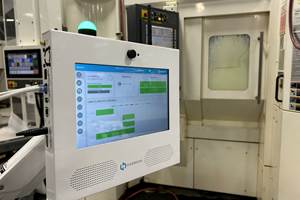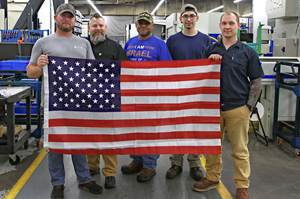Job Shop Grows With Punch Press Technology
GP Precision, a New Jersey-based precision sheet metal fabricator, was founded in 1966 to serve the prototype market of the electronics industry. Their original shop in Morris Plains, New Jersey, was expanded three times before they moved to Hackettstown in 1985.
Share





GP Precision, a New Jersey-based precision sheet metal fabricator, was founded in 1966 to serve the prototype market of the electronics industry. Their original shop in Morris Plains, New Jersey, was expanded three times before they moved to Hackettstown in 1985. This doubled their shop size and allowed them to expand their capabilities to include production runs. They moved again in October 1994, increasing their floor space from 5,000 to 20,000 sq. ft.
Today, GP Precision provides design engineering and production services for the telecom, medical, computer, fiber optic and audio markets with prototype and JIT monthly blanket orders. Parts are supplied complete, including plating, painting, silk screening, assembly and packaging. They have built their reputation on the quick turnaround of high quality parts in aluminum, steel, stainless steel, brass, copper and plastics. Their ability to keep up with this growth is attributable to how they've applied new punch press technology as it has become available.
GP Precision's capabilities include shearing, punching, forming, deburring, welding, spot welding, and hardware installation. The key to their success, according to owner/president, Art Cubbage, is the use of computerized equipment to process jobs quickly and accurately and limit downtime. GP Precision can produce 5,000-piece runs in three-to-four weeks in just about half the time it takes the majority of their competitors. Prototypes are often produced in as little as a day. Much of their ability to respond quickly has been provided by the use of CNC punch presses.
GP Precision's original move toward automation was a Super 30/30 from Strippit, Inc. (Akron, New York), a semi-automatic hole punching machine that is still in use today for less demanding applications that do not require a turret press. In 1984, the company purchased its first CNC punching machine, a Strippit CAP 1000. This computerized machine quadrupled their output. The amount of work they could do in 70 hours on the Super 30/30 could now be done in two days on the CAP 1000. "This enabled us to take more high volume jobs," Mr. Cubbage says. It also necessitated the move to Hackettstown, so they would have room to handle the increased work load.
In 1992, they purchased their first 1000R CNC turret punch press (now called the 1000/20). Although the running speed on the 1000/20 was the same as the CAP 1000, the new machine offered faster set-up times because of the high-speed turret design and new features like auto indexing. This allows tools to be rotated via the computer control so that the machine can punch more with fewer tool changes. The 1000/20 also features multi-tool, which increases the tool-carrying capacity of the turret.
In 1993, GP Precision purchased a Strippit 1000 XP/20, which provided "50 percent more output in the same floor space," Mr. Cubbage says. "This was very important in our old building because there was limited space." In 1994, they added another 1000 XP/20. With axis speeds up to 3350 inches per minute and hit rates up to 330 hits per minute in 11 gauge material, the 1000 XP's were twice as productive as the 1000/20 press. Once again, GP Precision found themselves having to move to larger quarters to accommodate the work.
Because of the rapid turnaround, GP Precision is now able to help its customers accurately schedule, "Just In Time" deliveries and keep costs down. "We're much more competitive because the XP is faster," Mr. Cubbage says. "We can take higher volume jobs now. We were on the outside edge before we got the XP machines. There is a major difference in volume output and improved turnaround. This makes us a better vendor to our customers."
He is also very pleased with the speed at which his operators were able to learn and use the PC-based controls that drive the machines. Parts are programmed in the engineering department, downloaded via floppy disk to the punch press and modified on the press if needed. PC-based equipment has also proven to be easy to service, according to Mr. Cubbage. "If a hard drive crashes, you simply swap the CPU and you're up and running," he says, but was quick to add that in the nine years they have used these machines, they have only had to replace one bulb.
Increasingly capable punching technology has helped GP Precision increase their productivity from average lot sizes of 70 parts 10 years ago to averages of 250 today. The company plans to add another Strippit punch press within the next year to help them keep up with the work volume and maintain their rapid turnaround. "Most of our competitors have a six-to-eight-week turnaround," Mr. Cubbage says. "Our normal turnaround is three-to-four weeks." The technology enables them to do that.
Related Content
The Power of Practical Demonstrations and Projects
Practical work has served Bridgerland Technical College both in preparing its current students for manufacturing jobs and in appealing to new generations of potential machinists.
Read MoreCan Connecting ERP to Machine Tool Monitoring Address the Workforce Challenge?
It can if RFID tags are added. Here is how this startup sees a local Internet of Things aiding CNC machine shops.
Read MoreHow I Made It: Amy Skrzypczak, CNC Machinist, Westminster Tool
At just 28 years old, Amy Skrzypczak is already logging her ninth year as a CNC machinist. While during high school Skrzypczak may not have guessed that she’d soon be running an electrical discharge machining (EDM) department, after attending her local community college she found a home among the “misfits” at Westminster Tool. Today, she oversees the company’s wire EDM operations and feels grateful to have avoided more well-worn career paths.
Read MoreFinding Skilled Labor Through Partnerships and Benefits
To combat the skilled labor shortage, this Top Shops honoree turned to partnerships and unique benefits to attract talented workers.
Read MoreRead Next
Setting Up the Building Blocks for a Digital Factory
Woodward Inc. spent over a year developing an API to connect machines to its digital factory. Caron Engineering’s MiConnect has cut most of this process while also granting the shop greater access to machine information.
Read MoreRegistration Now Open for the Precision Machining Technology Show (PMTS) 2025
The precision machining industry’s premier event returns to Cleveland, OH, April 1-3.
Read MoreBuilding Out a Foundation for Student Machinists
Autodesk and Haas have teamed up to produce an introductory course for students that covers the basics of CAD, CAM and CNC while providing them with a portfolio part.
Read More


















.jpg;maxWidth=300;quality=90)














